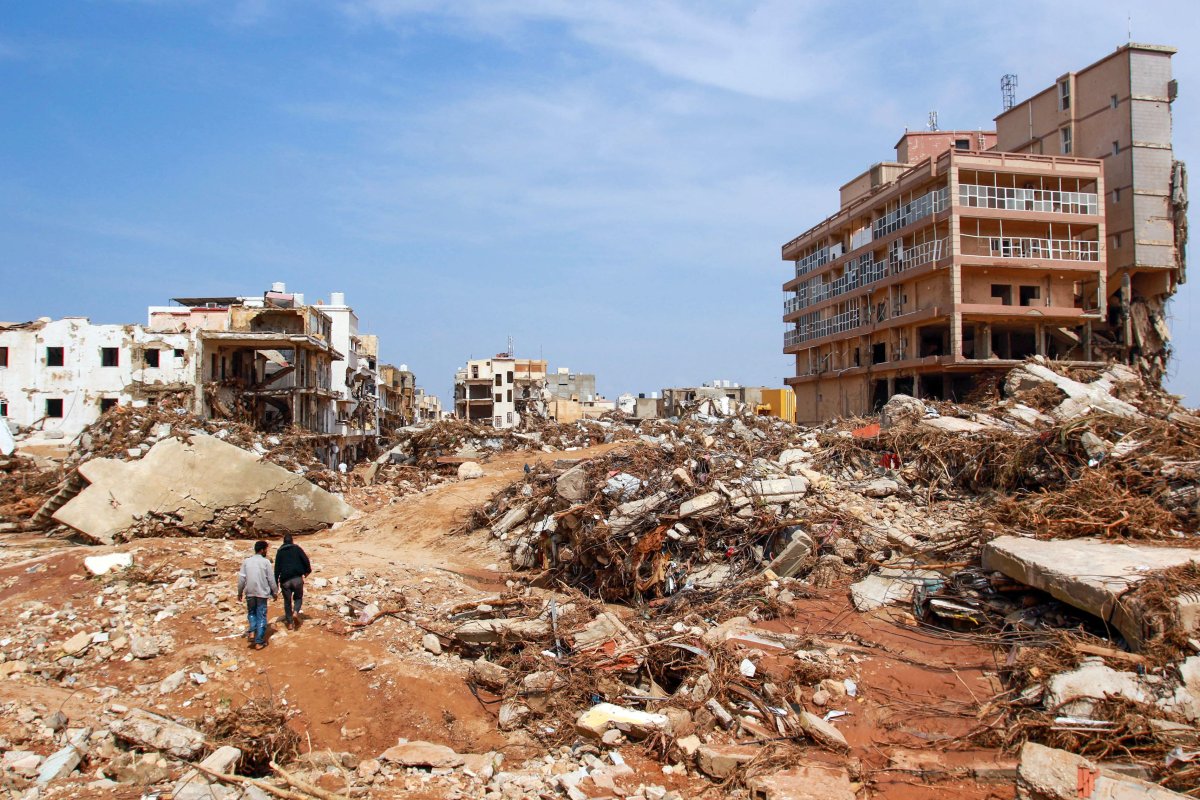A video circulating social media showed the horrific impacts of a deadly flood in Libya on Monday.
At least 2,000 people were killed after the floodwaters devastated the North African country. Many more are feared dead, as 10,000 people remain missing after Storm Daniel continued its trek across the Mediterranean on Monday.
The storm caused two dams to collapse in Libya, which sent rushing water into already flooded areas. The flooding was so intense that entire buildings were swept away. As much as 25 percent of the eastern coastal city of Derna was destroyed.
One horrifying video shared on X (formerly Twitter) on Tuesday morning showed floodwaters pouring down a road and rushing into cars in Derna, where 125,000 people live. Drivers tried to climb out of their windows and on top of their cars to avoid the flooding.
"Deadly flooding in Derna, Libya after storm Daniel resulted in collapsing of 2 dams nearby the city," the X account Truthpole said with the video.
The video had been viewed 14,000 times as of Tuesday afternoon. (Some readers may find this footage distressing.)
🚨 ATTENTION - Deadly Flooding in Derna, Libya after storm Daniel resulted in collapsing of 2 dams nearby the city 😔🙏🇱🇾
— T R U T H P O L E (@Truthpole) September 12, 2023
- 2300 people confirmed dead
- 10,000 people Missing#Libya #Flood #Derna #StormDaniel#Emergency #Fema pic.twitter.com/B3XufUJFLh
Photos and videos of the damage were shared widely across social media on Monday and Tuesday. Social media user Nahel Belgherze shared photos on X on Tuesday morning that displayed the aftermath of the deadly flooding. Belgherze called the destruction "apocalyptic," and several commenters said the photos showed a mass disaster of "biblical" strength.

"The scale and level of destruction is hard to comprehend. Local reports suggest that 25% of the city has been destroyed or severely damaged," Belgherze wrote with the photos.
More apocalyptic scenes emerging from Derna, Libya courtesy of ليبيا الأحرار
— Nahel Belgherze (@WxNB_) September 12, 2023
The scale and level of destruction is hard to comprehend. Local reports suggest that 25% of the city has been destroyed or severely damaged. Death toll now exceeds 3,500. pic.twitter.com/PnVyMyTh3x
The post had been viewed more than 324,000 times as of Tuesday afternoon.
The images showed wide swaths of mud filled with leftover debris from the flooding, including trees and cars. In one image, half of a building had been swept away by the flood. Much of the country's infrastructure had already been neglected because of the nation's political crisis, fueled by rival governments, the Associated Press reported.
In Florida, WFLA chief meteorologist Jeff Berardelli retweeted the images, calling the flood "quite a disaster".
One video shared on X showed an ominous onslaught of water rushing toward Derna after the dams broke. Another video showed a man crying next to the body of a family member amid the flood destruction.
Social media user Md Asif Khan shared several videos on X that showed the extent of the flooding. One video showed destroyed buildings, and another depicted massive amounts of floodwater inundating the city as rain continued to fall.
At least 2,000 people dead and 10,000 missing in Libya as flood swept away homes and swallowed entire neighborhood.
— Md Asif Khan (@imMAK02) September 12, 2023
A quarter of coastal city of Derna wiped out by this devastating flood.#Libya #LibyaFloods #Derna pic.twitter.com/n5HpJnYAKw
After the flood, bodies were lined up on the street outside of a crowded hospital as people searched for missing friends and family, Reuters reported. The hospitals in Derna were no longer operable and the morgues were full, according to a report by CNN.
"Bodies are lying everywhere—in the sea, in the valleys, under the buildings," Hichem Abu Chkiouat, minister of civil aviation in the administration that controls the east, told Reuters. "I am not exaggerating when I say that 25 percent of the city has disappeared. Many, many buildings have collapsed."
Daniel was informally categorized as a Medicane, or a Mediterranean cyclone.
AccuWeather senior meteorologist Alan Reppert told Newsweek that, typically, Medicanes track north or east rather than south, as Daniel did. He said the storm caused so much damage because it had excessive moisture and was slow-moving.
"When it did move southward from Greece into the central Mediterranean and Libya area, that's when it brought extreme rainfall, especially for this time of year," Reppert said.
In addition to affecting Libya, Daniel killed 15 people in Greece last week after nearly 30 inches of rain fell on the nation, which is equivalent to about 18 months of rainfall. After hitting Libya, the storm continued its trek along the North African coast but slowly began to lose strength.
Uncommon Knowledge
Newsweek is committed to challenging conventional wisdom and finding connections in the search for common ground.
Newsweek is committed to challenging conventional wisdom and finding connections in the search for common ground.
About the writer
Anna Skinner is a Newsweek senior reporter based in Indianapolis. Her focus is reporting on the climate, environment and weather ... Read more
To read how Newsweek uses AI as a newsroom tool, Click here.






